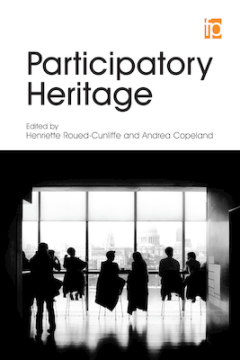
Additional Information
Book Details
Abstract
The internet as a platform for facilitating human organization without the need for organizations has, through social media, created new challenges for cultural heritage institutions. Challenges include but are not limited to: how to manage copyright, ownership, orphan works, open data access to heritage representations and artefacts, crowdsourcing, cultural heritage amateurs, information as a commodity or information as public domain, sustainable preservation, attitudes towards openness and much more.
Participatory Heritage uses a selection of international case studies to explore these issues and demonstrates that in order for personal and community-based documentation and artefacts to be preserved and included in social and collective histories, individuals and community groups need the technical and knowledge infrastructures of support that formal cultural institutions can provide. In other words, both groups need each other.
Divided into three core sections, this book explores:
- Participants in the preservation of cultural heritage; exploring heritage institutions and organizations, community archives and group
- Challenges; including discussion of giving voices to communities, social inequality, digital archives, data and online sharing
- Solutions; discussing open access and APIs, digital postcards, the case for collaboration, digital storytelling and co-designing heritage practice.
Readership: This book will be useful reading for individuals working in cultural institutions such as libraries, museums, archives and historical societies. It will also be of interest to students taking library, archive and cultural heritage courses.
This is a book of interesting and useful lessons learned, where readers can benefit from what the authors suggest they could have done differently ...a valuable addition to the literature, and I hope it is widely used.
Sarah R. Demb
Information Management Magazine
If you work in a college or university library and have ever tried to partner with a community group or heritage organization or are contemplating doing same, you will probably be well served by looking into this slim volume.
Michael Ryan
New York Historical Society Museum and Library
College & Research Libraries
Andrea Copeland is an Associate Professor in the Department of Library and Information Science in the School of Informatics and Computing at Indiana University, Indianapolis. Her research focus is public libraries and their relationship with communities, with a current emphasis on connecting the cultural outputs of individuals and community groups to a sustainable preservation infrastructure.
As this highly selective summary demonstrates, there is much in this volume for readers with a variety of interests, although not every case study will be of relevance to all...Nonetheless, there is real value in reading the studies as a whole. It will be thought-provoking for most readers, whether around the boundaries of our professional self-definition, the need to listen to communities in developing our work with them, or our understanding of linkages across the spectrum of what may be defined as heritage practice.
Melinda Haunton
The National Archives
Archives and Records
The internet as a platform for facilitating human organization without the need for organizations has, through social media, created new challenges for cultural heritage institutions. Challenges include but are not limited to: how to manage copyright, ownership, orphan works, open data access to heritage representations and artefacts, crowdsourcing, cultural heritage amateurs, information as a commodity or information as public domain, sustainable preservation, attitudes towards openness and much more. Participatory Heritage uses a selection of international case studies to explore these issues and demonstrates that in order for personal and community-based documentation and artefacts to be preserved and included in social and collective histories, individuals and community groups need the technical and knowledge infrastructures of support that formal cultural institutions can provide. In other words, both groups need each other. Divided into three core sections, this book explores: . Participants in the preservation of cultural heritage; exploring heritage institutions and organizations, community archives and group . Challenges; including discussion of giving voices to communities, social inequality, digital archives, data and online sharing . Solutions; discussing open access and APIs, digital postcards, the case for collaboration, digital storytelling and co-designing heritage practice. Readership: This book will be useful reading for individuals working in cultural institutions such as libraries, museums, archives and historical societies. It will also be of interest to students taking library, archive and cultural heritage courses.
Henriette Roued-Cunliffe DPhil is an Assistant Professor at the Royal School of Library and Information Science, University of Copenhagen, Denmark. She teaches and researches heritage data and information, and in particular how DIY culture is engaging with cultural heritage online and often outside of institutions. Her website is: roued.com.
